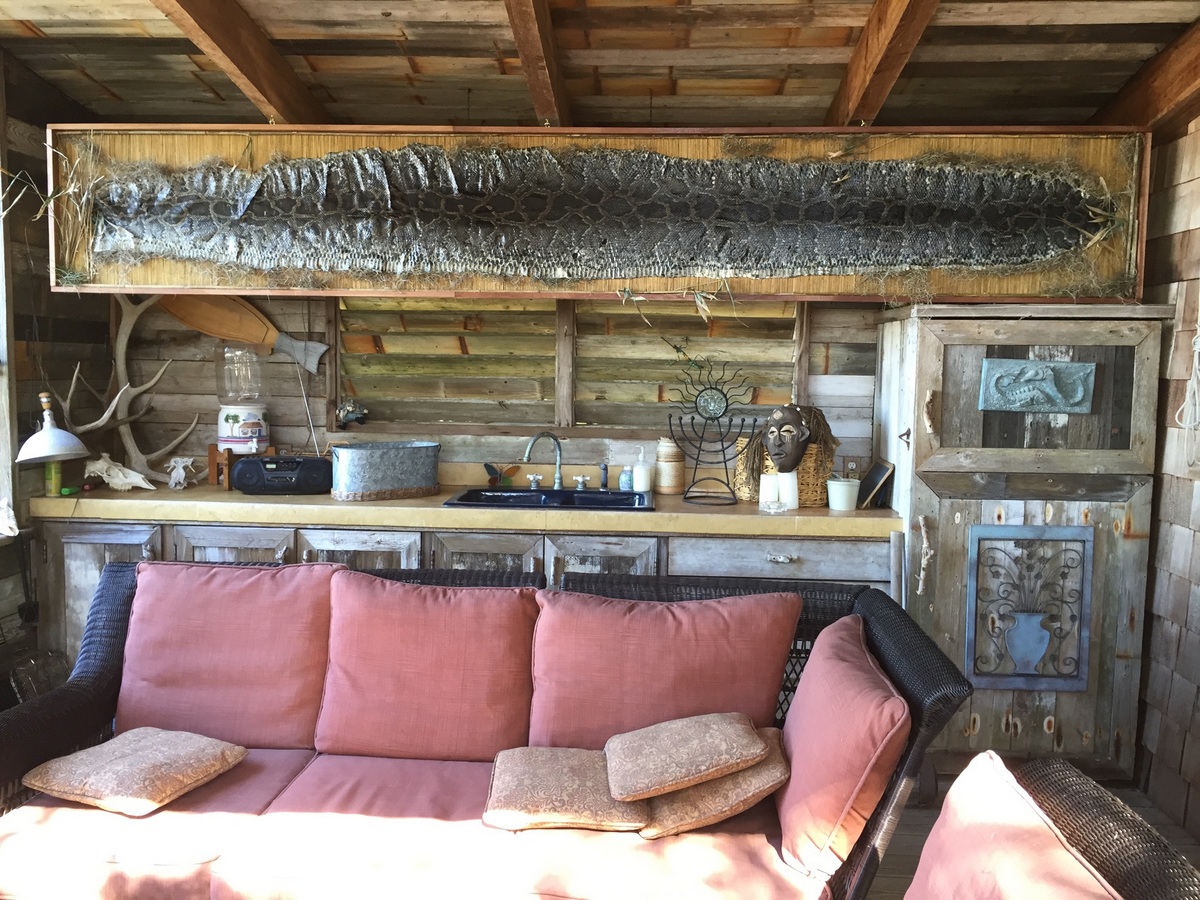By Lindsay Tahan | gargoyle@flagler.edu
To some, the Burmese pythons are slimy, perhaps even terrifying and somewhat mysterious creatures.
But to Jack Merwin, they are a thing of beauty. “Silent invaders of the Everglades – quiet killers from far away.”
That’s how he described the snakes in a poem.
“Masters of camouflage – embodiment of patience,” the 69-year-old psychologist wrote.
As much as Merwin admires the snakes, he knows they’re a nuisance in Florida and with that in mind, he took part in the 2016 Python Challenge on Jan. 16.
He and his team member Gabriel Pellicer, 31, captured and killed two big pythons. One measured 13-foot-1 and the other was 8-foot-4.
The largest of the snakes was a 95-pound female that had an empty stomach, but was full of eggs. The smaller snake was a male. Both of these Burmese pythons were captured within a quarter mile of Alligator Alley, the highway between Ft. Lauderdale and Naples.
“This is my first python hunt although I have a lifetime of experience hunting all sorts of critters, including alligators,” said Merwin, who has been nuisance alligator trapper for several years.

Skin of the 95-pound snake that Jack Merwin captured. Photo: Jack Merwin
The Florida Fish and Wildlife Conservation Commission sponsored the Python Challenge.
According to the commission’s website, there has been an increase in sightings of Burmese pythons in south Florida since the 1980s. Burmese Pythons are native to India, China, the Malay Peninsula and some islands of the East Indies. When these nonvenomous snakes reach lengths of over 8 feet they become a top predator.
The commission says Burmese pythons or Python bivittatus can grow up to 26 feet in length. Females can lay about 30 to 40 eggs per year. These snakes can live more than 20 years in captivity. In Florida the average size of captured pythons is 8 to 10 feet.
“The largest python I know of being caught this year was farther south in the Everglades – it was caught by a state wildlife agent – 17 feet plus,” said Merwin.
The Python Challenge or the Burmese Python Removal Competition started in 2013 and this competition was the first since that time. This 2016 Python Challenge ‘s started on Jan. 16 through Feb. 14 at the Florida International University’s Nature Preserve at the University Modesto Maidique Campus in Miami.
According to the Python Challenge website, the purpose of this competition is to help protect the Everglades ecosystem and the animals by removing these invasive, nonnative Burmese pythons. Anyone who is 18 and older is welcome to participate in the challenge as an individual or as a team consisting of two to five members. Before registering, participants must complete an online training module or an in-person training session and pass the quiz with at least an 80 percent.
Registration fees range from $25 to $75.
To capture the pythons, participants can use snake hooks, snake bags, snake tongs and non-motorizes tools. However, chemicals, explosives, bait, tapes or motorized tools are not allowed.
“The capture technique calls for catching the snake by the tail to wear it down for a few minutes as it attempts to escape. You can then pin the head down with a stick and kill the snake with a bullet to the brain or similar cranial trauma,” said Merwin.

Here’s how the snakeskin looks at Jack Merwin’s house. Photo: Jack Merwin
By Feb. 11, competitors had logged and processed 102 captured snakes. The competition ended on Feb. 14.
Some Burmese pythons that are removed from the Everglades contain levels of mercury that may be unsafe to ingest, but is not illegal to eat the snakes, according to the Python Challenge website. No suggests that participants eat the pythons.
Neither the Florida Department of Health nor the Florida Department of Agriculture and Consumer Services have declared that python meat is actually safe to eat, wildlife officials say.
After the snakes are killed, they are skinned. Participants can keep the snakeskins or sell them to local vendors.
Participants who kill the most and longest Burmese pythons captures win prizes ranging from $750 to $5000.
An award ceremony is scheduled to take place from 10 a.m. to 1 p.m. Feb. 27 at the Long Key Natural Area and Nature Center at 3501 SW 130th Ave, Davie, Florida.




Be the first to comment on "Poetic quest for slithering beasts of the Everglades"